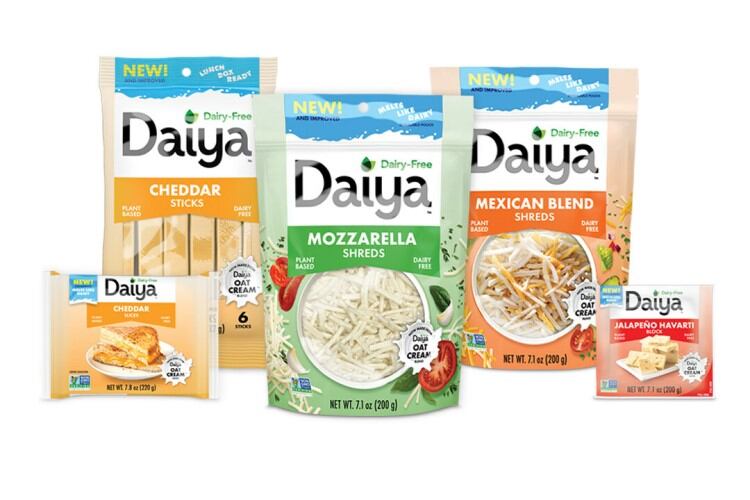Daiya Foods is among the pioneers in the plant-based cheese category in North America. Over the last 15 years, the company has grown to offer a range of pizza, mac & cheese and desserts and sauces both for retail and the food service industry, but plant-based cheese has always been at the heart of the company’s product development efforts. In recent years however, the plant-based cheese alternatives market has struggled to replicate the exponential growth rates it experienced in the pre-pandemic years.
Dairy’s domination and the challenges for plant-based cheese manufacturers
The plant-based cheese market has been showing signs of slowing in recent years – in the US, sales declined both in dollar (–2%) and unit (-5%) terms in 2022 following significant growth in the preceding two years, according to the Good Food Institute (GFI).
Household penetration has only grown marginally (from 3% to 5%) compared to 2019, repeat rates are down, and dollar sales have stalled at 1% over the last three years. Meanwhile, just 43% of shoppers who had tried plant-based cheese state they ‘like’ or ‘love’ it, and the top reasons for following a dairy-free diet are related to health and environmental concerns rather than taste.
At the same time, dairy cheese’s popularity in the US has skyrocketed in 2022 – according to USDA data, cheese consumption for 2022 set at an all-time high, with 42lb (more than 19kg) of cheese consumed on average per person, which represents a half-a-pound per-person increase.
So where does that leave dairy alternatives makers? There’s just one way out of the slump – product innovation. According to GFI, companies can look to appeal to consumers with better nutritional equivalence to dairy, improved protein and calcium content, and reduced saturated fat. Emerging protein sources can be explored to deliver this, while expansion to other cheese types such as soft and semi-soft cheeses like brie and Camembert. Improving flavor – by reducing off-notes – and improving functionality, e.g. melting and grating properties, can also help appeal to consumers.
Investment and the dawn of the Daiya Oat Cream blend
Daiya has too been mulling over improving its plant-based cheese. In March 2023, the company announced it had invested in new technology ‘to create a plant-based cheese that is tastier, meltier, and stretchier than any other on the market’. The firm would rely on natural fermentation to deliver this, and made a point to distance itself from ‘GMO techniques, such as precision fermentation’, making ‘GMO-free’ a key USP. Michael Watt, CEO of Daiya, said at the time: “We believe that the future of plant-based cheese achieving parity to dairy lies in traditional fermentation techniques. I don't believe any brand has fully cracked the code on a formula that cheese lovers feel entirely confident in – Daiya is going to change that.”
Around nine months later, the company launched the first products to benefit from the new manufacturing approach – and the first to feature Daiya’s proprietary cultured blend Oat Cream.
The proprietary ingredient is made up of oat flour, pea protein, water, cultures and enzymes, and Daiya says it sources glyphosate-free and certified gluten-free oats to make it.
“We take whole oat and mill it to our specifications that result in an extra fine flour, then blended with other ingredients specifically formulated to be used in our plant-based cheesemaking process, resulting in a proprietary ingredient that helps give our cheeses a smooth, creamy texture and dairy-like melt,” a company spokesperson told DairyReporter.
Daiya's dairy-free shreds, slices, blocks and sticks have all been reformulated with the new blend, which promises to deliver improved taste, texture and cheese-like functionality.
The nutritional labels of the reformulated products feature 1g of protein per portion instead of 0g before, and the products also pass as ‘a good source’ of calcium. But while the manufacturer has decreased its reliance on oils and starches, they still form part of the new formulations. Daiya’s spokesperson told us: “Our team has worked tirelessly to create a product with a similar nutrition profile to our dairy counterparts, and while we have made strides of improvements, Daiya is continuing work to provide the best nutritional profile possible.
“We have unlocked traditional, dairy-like culturing methods and applied it to plants, giving us the tastiest product possible. We’ve built our brand on the idea that it’s for everyone – and that will still be true for consumers who are intolerant to dairy. We aren’t mimicking animal protein, as with genetically modified precision fermentation techniques, we are applying age-old methods to natural plant ingredients.”
Consumers can expect to see the new products on shelves now, with new packaging and the same price point across major retailers in the US and Canada.

